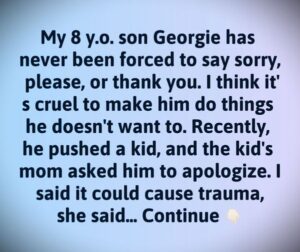
Parenting is no easy task. We all have our unique styles, and let’s face it, there’s no shortage of opinions – wanted or otherwise.
But for Emma, a proud member of the ‘understanding and empathic’ tribe, breaking the mold of traditional parenting has been a life-changing decision.
Parenting is no easy task. We all have our unique styles, and let’s face it, there’s no shortage of opinions – wanted or otherwise. But for Emma, a proud member of the ‘understanding and empathic’ tribe, breaking the mold of traditional parenting has been a life-changing decision.
Emma wasn’t always this way. Growing up in a household with strict rules and an unyielding focus on discipline, she knew the sting of being misunderstood. Her parents weren’t unkind, but they believed that children should be seen and not heard, their opinions secondary to the wisdom of their elders.
By the time Emma had her own daughter, Lily, she felt the weight of tradition pressing down on her. Should she continue the cycle, or could she carve out a different path? Her answer came one rainy afternoon when four-year-old Lily accidentally spilled paint across the living room carpet.
Emma’s first instinct was to scold. Her mother’s voice echoed in her mind: “Children must learn consequences!”
But as she looked into Lily’s wide, tear-filled eyes, Emma paused. Instead of yelling, she knelt beside her daughter, took a deep breath, and asked, “What happened, sweetheart?”
Between hiccupping sobs, Lily explained how she’d been trying to paint a rainbow for Emma, but the paint tray had slipped from her small hands. Listening to her daughter’s earnest attempt to create something beautiful, Emma’s heart softened. “It’s okay,” she said, gently pulling Lily into a hug.
“Accidents happen. Let’s clean this up together.”
From that moment on, Emma embraced a new approach to parenting – one centered on understanding, patience, and open communication. She swapped punishment for teaching moments, choosing to guide Lily through challenges rather than impose her will. It wasn’t always easy. There were tantrums, sleepless nights, and moments of doubt. But Emma saw the impact of her efforts in Lily’s confidence and kindness.
By the time Lily was ten, their bond had become a source of envy among Emma’s friends. One of them, Julia, remarked over coffee, “I don’t know how you do it. My kids don’t tell me anything anymore.”
Emma smiled, stirring her tea thoughtfully. “I listen first,” she said. “Sometimes that’s all they need.”
Breaking away from traditional parenting wasn’t just about raising Lily differently; it transformed Emma too. She learned to let go of perfection, to embrace her mistakes as opportunities for growth, and to foster a home filled with respect and love. Parenting, she realized, wasn’t about control but connection.
Today, as a teenager, Lily still turns to Emma with her joys and troubles. And while Emma knows she won’t always have the answers, she’s certain of one thing: empathy and understanding will always guide her way.